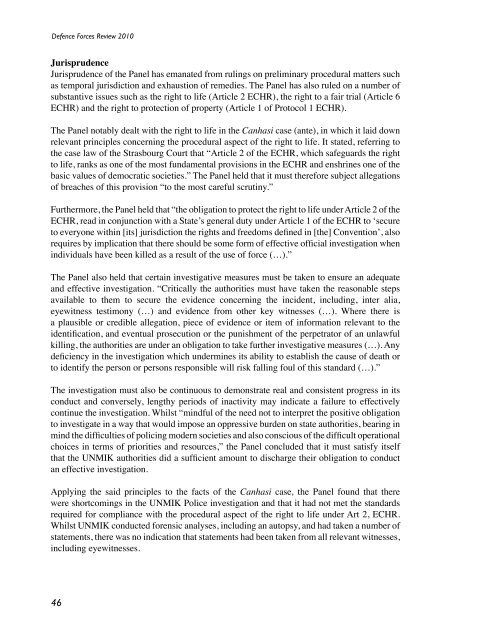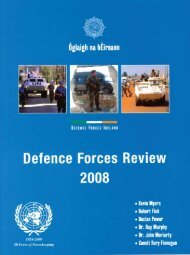Defence Forces Review 2010
Defence Forces Review 2010
Defence Forces Review 2010
Create successful ePaper yourself
Turn your PDF publications into a flip-book with our unique Google optimized e-Paper software.
<strong>Defence</strong> <strong>Forces</strong> <strong>Review</strong> <strong>2010</strong>JurisprudenceJurisprudence of the Panel has emanated from rulings on preliminary procedural matters suchas temporal jurisdiction and exhaustion of remedies. The Panel has also ruled on a number ofsubstantive issues such as the right to life (Article 2 ECHR), the right to a fair trial (Article 6ECHR) and the right to protection of property (Article 1 of Protocol 1 ECHR).The Panel notably dealt with the right to life in the Canhasi case (ante), in which it laid downrelevant principles concerning the procedural aspect of the right to life. It stated, referring tothe case law of the Strasbourg Court that “Article 2 of the ECHR, which safeguards the rightto life, ranks as one of the most fundamental provisions in the ECHR and enshrines one of thebasic values of democratic societies.” The Panel held that it must therefore subject allegationsof breaches of this provision “to the most careful scrutiny.”Furthermore, the Panel held that “the obligation to protect the right to life under Article 2 of theECHR, read in conjunction with a State’s general duty under Article 1 of the ECHR to ‘secureto everyone within [its] jurisdiction the rights and freedoms defined in [the] Convention’, alsorequires by implication that there should be some form of effective official investigation whenindividuals have been killed as a result of the use of force (…).”The Panel also held that certain investigative measures must be taken to ensure an adequateand effective investigation. “Critically the authorities must have taken the reasonable stepsavailable to them to secure the evidence concerning the incident, including, inter alia,eyewitness testimony (…) and evidence from other key witnesses (…). Where there isa plausible or credible allegation, piece of evidence or item of information relevant to theidentification, and eventual prosecution or the punishment of the perpetrator of an unlawfulkilling, the authorities are under an obligation to take further investigative measures (…). Anydeficiency in the investigation which undermines its ability to establish the cause of death orto identify the person or persons responsible will risk falling foul of this standard (…).”The investigation must also be continuous to demonstrate real and consistent progress in itsconduct and conversely, lengthy periods of inactivity may indicate a failure to effectivelycontinue the investigation. Whilst “mindful of the need not to interpret the positive obligationto investigate in a way that would impose an oppressive burden on state authorities, bearing inmind the difficulties of policing modern societies and also conscious of the difficult operationalchoices in terms of priorities and resources,” the Panel concluded that it must satisfy itselfthat the UNMIK authorities did a sufficient amount to discharge their obligation to conductan effective investigation.Applying the said principles to the facts of the Canhasi case, the Panel found that therewere shortcomings in the UNMIK Police investigation and that it had not met the standardsrequired for compliance with the procedural aspect of the right to life under Art 2, ECHR.Whilst UNMIK conducted forensic analyses, including an autopsy, and had taken a number ofstatements, there was no indication that statements had been taken from all relevant witnesses,including eyewitnesses.46
















